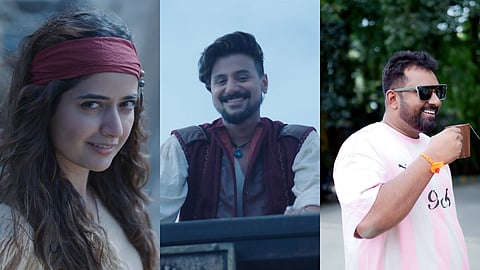

From Simple Agi Ondh Love Story to Chamak, Sakath to his last Ondhu Sarala Prema Kate, director Suni has carved a niche for himself with stories that blend humour and heart. His upcoming film Gatha Vaibhava, produced by Servegara Silver Screens and Suni Cinemas, will release in Kannada and Telugu. While the title might suggest a sprawling period drama, Suni clarifies that he remains faithful to his signature style, only now on a grand canvas that spans mythological times and reincarnations. Ahead of its November 14 release, Suni opens up about returning to simplicity, experimenting with lavish visuals, and trusting new talent.
The title Gatha Vaibhava sounds grand. What kind of story are you telling this time?
It might sound lavish, but Gatha Vaibhava stays true to my signature style. I’ve never really moved away from simplicity, which audiences have always appreciated. At its heart, it’s like a Simple Agi Ondh Love Story: a boy, a girl, love, and emotion. But this time, it’s told through a reincarnation plot. There’s humour, yet it’s deeply emotional.
What drew you back to this kind of story?
Even though making mass-appeal films comes naturally to me, I realised audiences connect more with honesty and heart. Simplicity in emotion travels further than any formula. Gatha Vaibhava is my way of returning to that space. Telling simple stories, or simplicity is my luxury.
The film seems visually lavish...
Lavish doesn’t always mean massive sets or ornate costumes. It’s in the details, the emotions, the design, and the way we frame each era. Part of the story is set in Devaloka, the abode of the gods, during the Samudra Manthana period, when they sought Amrutha, the nectar of immortality. The narrative also travels through time, reaching the Portuguese era. So visually it’s large, but emotionally, it remains intimate.
Why set a simple love story against such expansive historical and mythological backdrops?
I didn’t choose to create grandeur for the sake of it. The period setting naturally emerged from the reincarnation plot. I wanted to show how love transcends time. Whether it’s gods, kings, or ordinary people, emotions stay the same. Gatha Vaibhava reflects that continuity, how love and loss repeat yet feel new each time.
You often work with fresh faces. This time too, the lead is Dushyanth.
Yes, I enjoy that. I don’t chase big names. When producers or actors trust my storytelling, it’s safe to experiment. Dushyanth comes from theatre, not a film background, but he’s done his homework. We rehearsed extensively before shooting.
And how was it to work with Ashika Ranganath?
Though established, Ashika approached this film with the enthusiasm of a newcomer. She learned the Mangaluru dialect and rehearsed diligently with the team. That effort brings truth to her performance. She adds grace and warmth to the film.
You have a rather interesting actor playing the villain
Kishan Bilagali, a dancer, actor, and Bigg Boss contestant, plays a pivotal role. He has an almost divine aura, fitting for the character. He isn’t a typical villain but carries dignity and power. Karthik from Mangaluru also plays an important part. Together, the ensemble gives the story a layered texture.
You mentioned making Gatha Vaibhava feel like four films in one. Why?
Because of the variety. We shot across Mangaluru, explored Portuguese influences, handled a large cast, and spent months in post-production. Each stage felt like a new challenge and a new lesson.
Music and visuals are key to your films...
Judah Sandhy returns as composer. He understands when a scene needs silence or melody. William J David’s cinematography captures grandeur and intimacy, complemented by production design from Shivakumar, Ullash Hydoor, and Raghu Mysore. The visuals are poetic but never overdone.
What do you want audiences to take away from Gatha Vaibhava?
At its core, it’s about love that survives lifetimes. It’s emotional, humorous at times, a little mystical, but above all, human. Whether in Devaloka or on present-day earth, emotions remain the same. That’s the timeless essence of Gatha Vaibhava.
You are releasing the film in Kannada and Telugu...
Previously, my films were dubbed into Telugu. This time, it will be released simultaneously in both languages. It wasn’t planned during shooting, but the production team felt the story deserved a Telugu release as well.